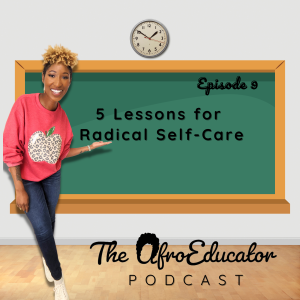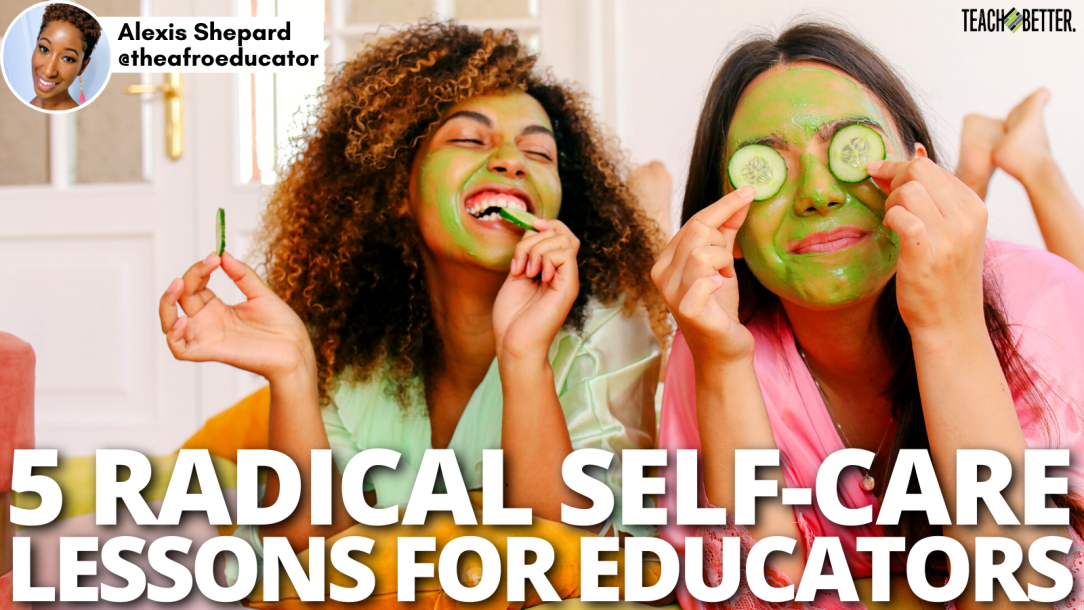TL;DR:
- Burnout is not “this is just how it is.”
- We need to prioritize our own wellness.
- Self-care isn’t selfish and it’s not about temporary relief.
- You must put the work in to maintain boundaries and demonstrate self-care.
- Set office hours for yourself.
- Embed wellness routines into your classroom to model self-care for students too.

Burnout
Six years ago, I burned out for the first time. It took me a while to even identify what I was going through. Even once my burnout had a name, my thought was “this is just how it is.” I truly believed that I had to suffer in silence.
It wasn’t until 2018 that I realized that maybe, just maybe, I could prioritize my own wellness in a way that would help me stand up to the larger issues facing classroom teachers.
The AfroEducator
When I created The AfroEducator originally, I didn’t intend for my platform to focus on teacher wellness. I didn’t even know what teacher wellness was. I remember trolling Twitter one day though and seeing a couple of tweets related to teacher self-care. Up until this point, I hadn’t even really heard of self-care. Those tweets—after my encounters with burnout—resonated with me. It was ultimately those words, and a subsequent podcast guest appearance, that launched me into the teacher wellness space. My passion for this work grows stronger with every story of burnout, every DM conversation, and every blog post that documents yet another educator’s experience.
Through all of my experiences and growth over the past few years, I’ve learned there are some key lessons to true self-care that I wanted to share here with you today.
I want to be very clear that I’m not proposing self-care as a solution to the many and varied issues that plague the teaching profession. However, I do believe and stand by the fact that self-care helps us stay more whole so that we have the capacity to fight and stand up to the issues in ways that create real changes that teachers, students—and ultimately our communities—deserve.
Click to Listen to the Podcast Episode
Self-care helps us stay more whole so that we have the capacity to fight and stand up to the issues in ways that create real changes that teachers, students - and ultimately our communities - deserve. Click To Tweet
1. Self-care isn’t self-serving.
2. Self-care isn’t a quick fix.
3. Self-Care is NOT the same as self-indulgence.
4. You can embed self-care/wellness practices into your instruction.
When I first entered the teacher wellness space, self-care seemed like something to do before or after school, but I couldn’t quite wrap my mind around how self-care could permeate into more aspects of my life; until I listened to a podcast from Angela Watson that encouraged me to set more strict parameters around my time. Teachers have this lack of mentality around time because of the lack of autonomy over how much of it is spent. Most days, we know where we will be and who we’ll be with down to the minute.
Setting boundaries around my time looked like setting office hours, communicating those hours, and sticking to them. Initially, this was difficult to adhere to because I was used to answering emails long after school ended or well before school started. When I instituted “office hours,” it was a game-changer. This was really when I opened my mind to the idea that I could do other things in my teaching practice to support my self-care.
I began to implement other strategies that helped me place my energy and time into high-value tasks and eliminate, or greatly reduce, the time I used to spend on menial tasks that really didn’t matter. My classroom was automated by relying heavily on set, patterned daily routines which allowed students to operate more independently.
Because of this, my students relied less on me to repeat instructions. I was able to shift away from the draining role of a “Sage-on-the-Stage” and become more of a facilitator that probed and extended their learning. I began using screencast videos for whole group mini-lessons and reviews. I also introduced my students to mindfulness exercises and the Pomodoro technique.
By helping my students develop self-awareness and time management skills, I was also contributing to my own well-being too.
5. Self-awareness is the key to real self-care.
Self-care, at its core, is about making mindful choices that serve the version of yourself you want to be. We can’t do that unless we have a deep and integral knowledge of who we are, what we need, and what we want. That awareness starts with reflection and simply taking stock of the stories we tell ourselves and what we already believe. It begins with noticing our feelings and our actions as we work to maximize our time, energy, and joy.
The reality is that teachers have been propping up K12 education in the US for a long time. Its slow crumble is quickly turning to disaster, the effects of which are ripping through our nation’s schools and classroom teachers are feeling the weight of a system on the brink of collapse.
And while self-care isn’t the solution, radical self-care is an individual step forward within the collect movement. It’s the pushback against a narrative that would rather see us so burned out.
My Favorite Wellness Resources To Enhance Your Journey Towards Radical Self-Care
People to Follow:
Books To Read:
Podcasts to Listen to:
About Alexis Shepard
Alexis Shepard is a 9th year middle school teacher in Upstate, South Carolina with both middle level and elementary experience. After multiple encounters with burn-out, a desire to take steps towards self-care led to the creation of her brand, The AfroEducator. Originally intended to facilitate connections with likeminded educators, a passion was ignited in Alexis to empower teachers towards wellness.
In her work, Alexis seeks to create pervasive perceptions of wellness that will improve teacher outlook and sustainability. She champions teacher self-care through education, reflection, and dialogue. Alexis believes that by sharing stories, she can inspire and empower teachers to take control of their own narratives so that they can teach and live with joy.




